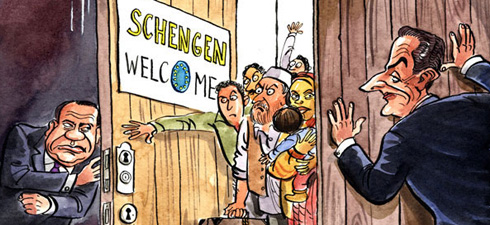Let’s imagine for a moment that border controls within the European Union (EU) are reinstated. It would be a disaster. Citizens would waste their time at checkpoints, border guards and customs officials would once again be overwhelmed by the resulting workload and would strike to demand a simplification of procedures (as French and Italian customs officers did in the early 1980s, contributing to the establishment of the first Schengen Agreement, which was signed on 14 June, 1985, in the eponymous town in Luxembourg). Public spending budgets would have to be increased to cope with more personnel and border infrastructure, and Europe’s citizens would have to buy higher priced products and pay more income tax to cover the added costs.
Not only would it mark a return to the pre-1985 situation, but the change would also come at a very high price for the EU: the shelving of one of its basic principles which is freedom of movement. The Schengen Area has given us a feeling of belonging to a single territory. When we cross internal European borders by train or car and all we see is a sign where in the past we had to contend with roadblocks and police, that is when we perceive the reality created by the EU. What was “foreign” has become much less alien. If we re-introduce border controls, we will be facilitating a resurgence of “tribalism” among European peoples: our neighbours will once again become “foreigners,” and they will be more foreign than they were before. And that will be the beginning of the end for the Union.
Worrying tendencies in member states
For the moment, what France and Italy have demanded is a re-introduction of internal border controls for a limited period, but not just for reasons of public order and national security (because border controls for both of these reasons are already addressed by the current treaty). There were other reasons. Italy had issued permits to tens of thousands of North African migrants, authorising them to travel anywhere in the Schengen Area — a move opposed by France which did not want to receive them.
It was this Franco-Italian conflict that resulted in a joint letter addressed to the European Commission by Silvio Berlusconi and Nicolas Sarkozy. It seems to me that adding to the list of reasons which can be cited to justify the reintroduction of controls is a kind of “maximum demand” tactic, whose goal is to relaunch negotiations on the highest level. But it still has a hollow ring to it. Both of the requesting countries also want a greater operational role for the Frontex border agency, but here, Berlusconi and Sarkozy are preaching to the converted: under the terms of the Lisbon treaty, Frontex is already due to take on a greater role.
On 12 May, the European Commission will also present its own plan for the reform of Schengen. The Commissioner for Home Affairs, Cecilia Malmström, has written on her blog about the “worrying tendencies in member states” (guess who…) that are “too event-driven” and eager to implement “quick-fix measures.” She has also emphasised the importance of a migration policy that is protected from the “pressure of populist movements.”
Identikit picture of the populist voter is changing
Well said indeed. However, as it stands, countries are implementing their own policies, and while the South (which is more vulnerable to migration pressure) has been in conflict with the North on this issue, populist movements have succeeded in obtaining greater support from countries — like the Netherlands, Denmark and Finland — which have been perceived as tolerant and in favour of a more harmonious approach. Populist politicians are developing a more elaborate discourse on the issue: they are not opposed to foreigners per se, but they are eager to imbue voters with a fear of uncontrolled immigration that will cost them their jobs.
The identikit picture of the populist voter is also changing: the aging poorly educated industrial worker of times past has now been replaced by a 40-year-old male of average education earning an average wage – that is to say someone who is relatively well off. The preoccupations of voters in this category are sincere and understandable. And it follows that it is relatively easy to convince them that the key to preserving what they have is to close the doors and windows to the house where they feel so comfortable, in advance of the arrival of the “others” with whom they will be forced to share their wealth in the interest of European solidarity and freedom of movement.
Was this article useful? If so we are delighted!
It is freely available because we believe that the right to free and independent information is essential for democracy. But this right is not guaranteed forever, and independence comes at a cost. We need your support in order to continue publishing independent, multilingual news for all Europeans.
Discover our subscription offers and their exclusive benefits and become a member of our community now!












